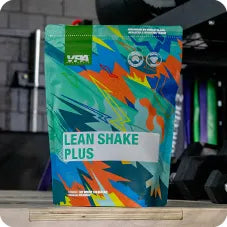- $0.00 AUD Subtotal
Prebiotic Collagen Protein for Gut Health and Weight Loss: What You Should Know
July 04, 2025 7 min read

What Is Prebiotic Collagen Protein?
Prebiotic Collagen Protein is a specially formulated supplement blending hydrolysed collagen peptides with prebiotic fibres. Fitness enthusiasts swear by this supplement to promote overall health, including gut, skin, joint, and metabolic well-being.
To prepare prebiotic collagen protein, hydrolysed collagen is broken down into smaller peptides and amino acids for easier absorption. When combined with prebiotic fibres like inulin and probiotics like Bacillus coagulans, this product supports the structure of your gut lining. It nourishes the beneficial bacteria that live in your digestive system.
Unlike standard collagen or fibre supplements, prebiotic collagen protein for gut health delivers a promising set of benefits, helping users manage weight and feel better from the inside out.
How Prebiotic Collagen Supports Gut Health
What are prebiotics, and how do they help the gut?
Collagen for gut health is a well-discussed topic. Prebiotics are non-digestible fibres that pass through the small intestine and stimulate the growth of beneficial gut bacteria. They are not digested; instead, they are fermented by gut bacteria, which in turn provides health benefits.
Studies suggest that consuming 3 - 5 g of prebiotics 1 a day plays a crucial role in promoting digestive health, enhancing nutrient absorption, supporting weight loss, and even improving immune function.
The role of collagen in gut lining and digestive health
Collagen is a major structural protein found in connective tissues, including the lining of your gastrointestinal tract. It supports bones and muscles and is excellent for maintaining skin elasticity.
However, its most important role lies in supporting the gut lining and digestive health. Collagen provides essential amino acids, such as glycine and proline, which are crucial for rebuilding and maintaining the gut lining. A healthy gut lining prevents toxins and pathogens from entering the bloodstream, an essential function often referred to as "gut barrier integrity 2 ."
With age, the body produces less collagen, which compromises the gut barrier and can lead to issues such as leaky gut syndrome, bloating, poor nutrient absorption, and increased frequency of illnesses. Supplementing with collagen peptides helps reinforce this barrier, supporting long-term digestive health.
Combining prebiotics and collagen for gut health
When prebiotic fibres are combined with collagen peptides, the benefits are twofold. While collagen rebuilds and repairs the gut lining, prebiotics work on the microbial side, promoting a healthy and balanced environment in the digestive tract. Together, they support smoother digestion, enhanced nutrient absorption, reduced bloating, increased weight loss, and improved overall gut health and resilience.
Can Prebiotic Collagen Protein Help with Weight Loss?
Gut health and its link to metabolism and weight regulation
Collagen for weight loss is another commonly discussed topic among gym enthusiasts. The state of your gut health plays a direct role in your body’s metabolism and how efficiently it processes calories. A healthy, balanced gut can regulate appetite hormones, reduce inflammation, and improve insulin sensitivity. All these factors contribute to maintaining a healthy weight. Alterations in the gut microbiota from prebiotic collagen protein for weight loss result in the activation of metabolic pathways 3 that inhibit obesity.
Prebiotic fibres slow digestion and regulate blood sugar, preventing energy crashes and unnecessary snacking. Thus, taking prebiotic collagen for gut health enhances nutrient absorption, enabling the body to utilise fuel more effectively.
How protein (including collagen) supports satiety and appetite control
Protein is known for promoting feelings of fullness. This helps reduce overall calorie intake. While traditional proteins, such as whey, are more complete in their amino acid profile and often better for satiety, collagen still supports appetite regulation and energy balance. It reduces hunger by slowing gastric emptying, especially when taken with meals.
For those trying to manage their weight, supplementing with protein, even in the form of collagen, is a smart strategy. It helps reduce cravings, maintain lean muscle mass, and support a sustainable calorie deficit.
Collagen and lean muscle support
Collagen provides amino acids that support the formation of connective tissues, including ligaments, tendons, and fascia. These play a crucial role in physical activity and recovery. While collagen is not a complete protein like whey, it’s excellent for supporting the structures around muscles, helping reduce joint pain, and improving mobility.
By promoting exercise consistency and reducing the risk of injury, collagen indirectly supports the maintenance of lean muscle and promotes fat loss. However, It’s not a magic fix. Rather, it is helpful in maintaining a healthy routine. When combined with regular physical activity and a nutritious diet, collagen can be a powerful ally in your weight management journey.
Other Prebiotic Collagen Protein Benefits
The benefits of collagen are plenty, as discussed below:
Skin, hair, and nails
Collagen is a building block for skin elasticity, hydration, resilience, and smoothness. Supplementing with hydrolysed collagen reduces fine lines and promotes stronger hair and nails. When gut health improves, it often reflects outwardly in the form of clearer skin, shinier hair, and less acne. Talk about outer beauty coming from within!
Joint and bone support
The amino acids in collagen rebuild cartilage, improve joint cushioning, build elasticity, and reduce inflammation. This makes it a valuable supplement for individuals with joint pain or those leading active lifestyles. Additionally, collagen supports bone mineral density 4 by providing structure to the bone matrix, which is especially important with aging.
Recovery and general wellness
Besides taking collagen for gut repair and joint health, you can also consume it to repair connective tissues and support a healthy inflammatory response after workouts. It also supports arterial structure, and makes sure arteries are well-developed and blood flows effortlessly throughout the body. When combined with prebiotic fibres and probiotics, it can also strengthen the immune system. This results in better recovery, fewer digestive issues, more weight loss, and improved energy levels.
How to Use Prebiotic Collagen Protein for Gut & Weight Goals
-
Recommended dosage: A daily dose of 2.5 - 15 g 5 may be safe and effective, depending on your diet, supplement type, age, and general health.
- However, most people see the best results from around 10 - 15 g of hydrolysed collagen per day, often delivered in one scoop of powder. Take for example, VPA’s Prebiotic Collagen Protein that comes in a scoop size of 13.5g per serving.
-
Timing: You can take it any time of day. Some prefer it in the morning for digestive support, while others take it post-exercise for recovery.
-
Mixing options: This supplement is typically neutral-tasting or lightly flavoured, so you can add it to water, smoothies, shakes, coffee, or even yoghurt.
-
Daily routine: For best results, use it consistently for at least 4 to 8 weeks. Many people report digestive relief, better skin, stronger muscles, and more energy within that time frame.
- Safety tips: Introduce prebiotic fibres gradually, mainly if you’re not used to high-fibre diets, to avoid bloating or gas in the beginning.
Why Choose VPA’s Prebiotic Collagen Protein?
VPA’s Collagen Pro Protein Powder is the best prebiotic collagen protein in Australia. It combines high-quality Collagen Hydrolysate and the most effective probiotic strain of Bacillus coagulans, along with Inulin to give the best possible results in replenishing the intestinal ecosystem, fostering the growth of good bacteria and improving gut health
The formula is third-party batch-tested, and almost flavourless, making it easy to include in your daily wellness routine.
Conclusion
Prebiotic Collagen Protein offers a unique combination of benefits for anyone looking to improve their gut health, support weight loss, and enhance general skin and bone wellness. Collagen strengthens the gut lining and supports connective tissues, while prebiotic fibres nourish beneficial bacteria and help regulate metabolism and fat loss.
Although it differs from whey protein for weight loss, collagen for gut health still plays a crucial role in satiety, mobility, structural support, and overall well-being. When comparing collagen vs whey protein, those seeking a holistic solution that supports digestion, skin, joints, and energy, while managing weight, must consider prebiotic collagen protein.
FAQs
What is prebiotic collagen protein?
A combination of hydrolysed collagen peptides and prebiotic fibre (often inulin), designed to support gut health, digestion, bone and joint structure, and overall wellness.
Is prebiotic collagen protein good for you?
Yes. It can improve gut function, support joint and skin health, and help regulate metabolism and manage weight when taken consistently.
How does collagen support gut health?
Collagen for gut health contains amino acids that help repair the gut lining, while prebiotics feed beneficial bacteria. Together they strengthen digestive function.
How long does it take for collagen to heal the gut?
You may notice prebiotic collagen protein benefits like improved digestion and skin elasticity within 4-8 weeks. Joint health improvements may take longer. Prolonged and consistent use is recommended to see maximum benefits.
Can collagen protein really help with weight loss?
It can support weight loss indirectly by improving satiety, reducing joint discomfort (helping with exercise), and improving gut health and metabolism.
How much collagen should I take for weight loss?
Around 10 - 20 g daily, alongside a balanced diet and regular physical activity.
Does collagen speed up metabolism?
Collagen supports muscle maintenance and gut function, which can positively influence metabolic efficiency.
When should I take prebiotic collagen protein?
Anytime – morning, post-workout, or with meals. Consistency is more important than timing.
Can I take prebiotic collagen every day?
Yes, daily use is safe and recommended for best results.
Are there any side effects to collagen or prebiotics?
Side effects are rare. Some people may experience mild bloating when first introducing prebiotic fibre, but this usually subsides with regular use.
What makes VPA’s prebiotic collagen different?
It combines hydrolysed collagen with inulin and probiotics in a flavour-neutral, allergen-free, third-party tested formula that supports gut, joint, and metabolic health, and is easy to include in your daily routine.
References:
-
WebMD Editorial Contributor. Foods high in prebiotics. WebMD. Reviewed September 16, 2024. Accessed June 24, 2025. https://www.webmd.com/diet/foods-high-in-prebiotic
-
Assimakopoulos SF, Triantos C, Maroulis I, Gogos C. The role of the gut barrier function in health and disease. Gastroenterol Res. 2018;11(4):261–263. doi:10.14740/gr1053w
-
Baek GH, Yoo KM, Kim SY, et al. Collagen peptide exerts an anti-obesity effect by influencing the Firmicutes/Bacteroidetes ratio in the gut. Nutrients. 2023;15(11):2610. doi:10.3390/nu15112610
-
Sissons B. Is collagen helpful for osteoporosis? Medical News Today. Published June 1, 2023. Accessed June 24, 2025. https://www.medicalnewstoday.com/articles/collagen-for-osteoporosis
-
Snyder C. How much collagen should you take per day? Healthline. Updated June 2, 2025. Accessed June 24, 2025. https://www.healthline.com/nutrition/how-much-collagen-per-day
Also in Featured

Are creatine gummies a scam? We think they are.
August 29, 2025 4 min read

10 Proven Whey Protein Benefits (and Why WPI Might Be the Best Option)
August 26, 2025 9 min read
Read More
Third-Party Tested Supplements in Australia: Why It Matters More Than Ever
August 08, 2025 7 min read
Read More Recent Articles
- Are creatine gummies a scam? We think they are.
- 10 Proven Whey Protein Benefits (and Why WPI Might Be the Best Option)
- Third-Party Tested Supplements in Australia: Why It Matters More Than Ever
- 7 Best Protein Powders for Weight Loss in Australia (Updated 2025)
- Prebiotic Collagen Protein for Gut Health and Weight Loss: What You Should Know
- Fat burning zones: What is the Best Heart Rate for Losing Fat?
- VPA Australia's Christmas in July Gift Giveaway!
- The Power of V02max: Why Boosting Your VO2 Max is a Fitness Gamechanger
- The Fundamentals of Metabolic Health for Fitness Enthusiasts
- Outback Adventure Workouts: Ditch the Gym and Embrace the Winter Sunshine!













